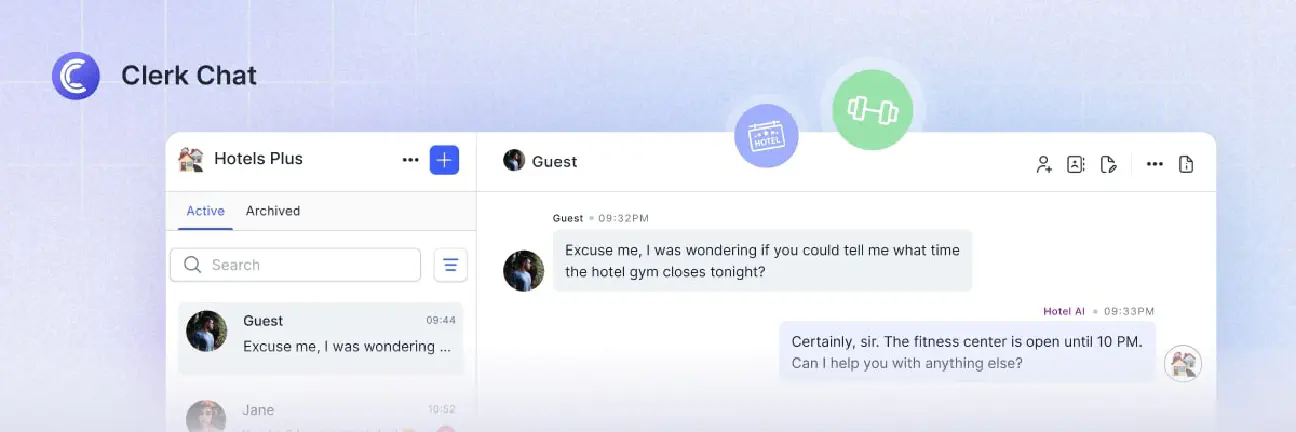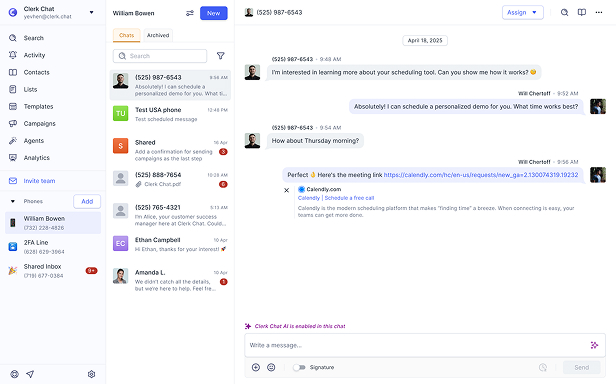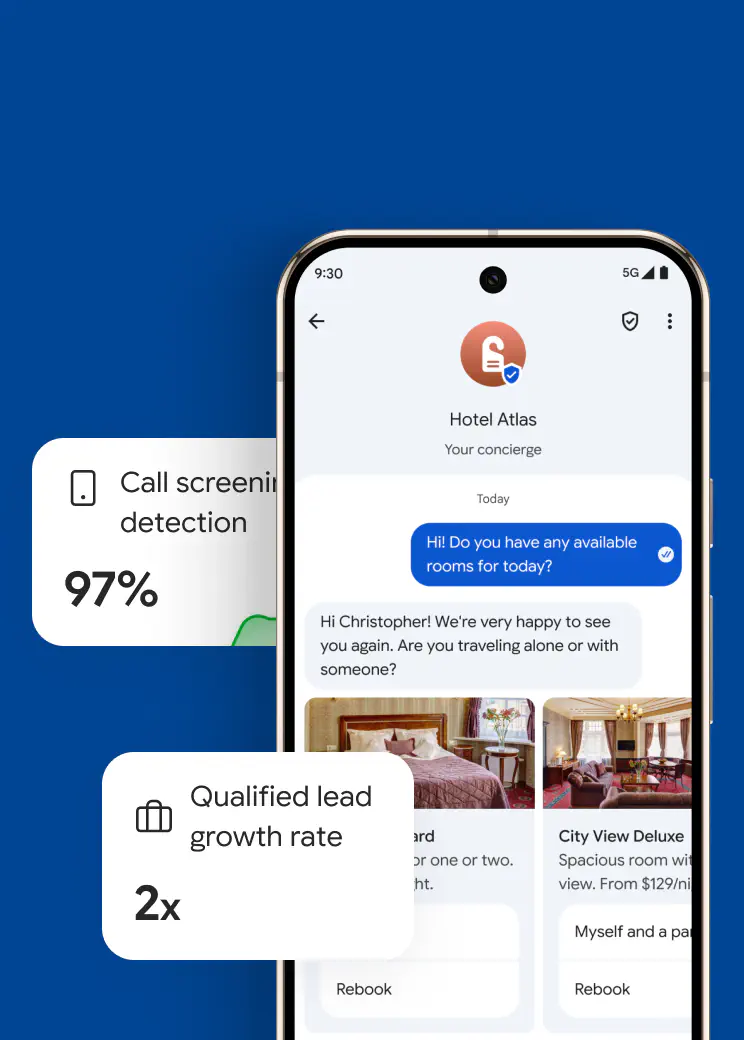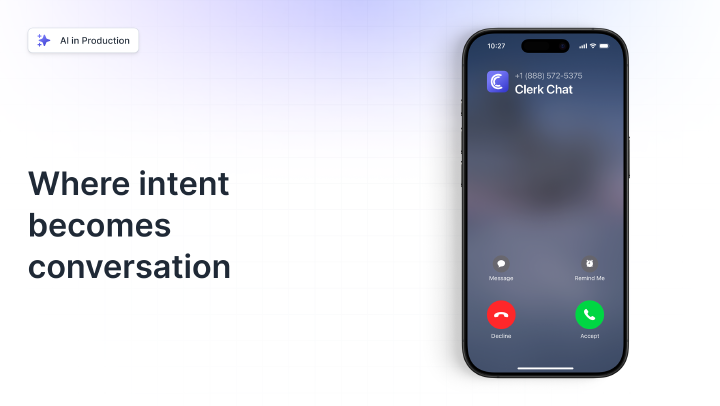Conversational AI for Hospitality - From Check-In to Check-Out
By William Bowen
- Published: April 23, 2025
In a sector like hospitality, where sustainable growth relies exclusively on strong relationships with consumers, companies often need to take extra steps to exceed expectations. That’s where conversational AI for hospitality brands makes a huge difference.
Conversational AI, combined with a hotel text messaging solution, other communication channels, and databases, can revolutionize how you serve and support your guests. The right technology makes it easier to deliver fast, seamless, 24/7 experiences to customers, wherever they might be.
Beyond that, an effective conversational AI solution has the power to boost team efficiency and productivity, minimize operational costs, and help you make more data-driven decisions.
Here, we’re going to show you exactly how conversational AI for hotels and hospitality companies can turbocharge your chances of success in a competitive market. Plus, we’ll share our top tips to make implementation as simple and painless as possible. Let’s dive in.
In this article:
What is Conversational AI for Hospitality?
Conversational AI is a type of artificial intelligence that allows machines to process, understand, and respond naturally to human language. Common in the world of AI and customer experience, conversational AI tools leverage natural language processing and machine learning, to power systems like intelligent chatbots, virtual assistants, and autonomous agents.
In the hospitality sector, conversational AI can help companies deliver faster customer service responses, personalize interactions, automate tasks like room bookings and collecting feedback, and more. AI tools can support guests, travelers, and even team members, making sure your business runs as smoothly as possible.
As an example, a digital booking agent powered by conversational AI could help customers find and book a flight or room, while a chatbot suggests activities and local attractions with personalized text messages based on a customer’s profile and history.
When a customer reaches a hotel, a voice-powered assistant could help them make requests, answer questions, and adjust room conditions, all without having to contact the front desk.
The ability of conversational AI to improve customer satisfaction and efficiency is leading to rapid adoption across the hospitality landscape. Plus, many customers now expect hospitality brands to embrace AI, with 67% of customers prioritizing staying at hotels with AI-powered tools.
Give your guests the VIP treatment - at scale.
Learn how to bring AI-powered conversations to your hospitality business for 24/7 support & personalized messaging.
Use Cases of Conversational AI for Hotels and Hospitality Brands
As artificial intelligence and machine learning algorithms grow more advanced, the use cases for conversational AI for hospitality brands are constantly growing. These days, companies can use AI for everything from designing a personalized conversational marketing strategy, to streamlining support, automating tasks, and even updating pricing strategies.
Here are some of the most significant use cases for conversational AI in hospitality.
Enhancing Guest Experiences
Probably the most obvious way to use conversational AI for hospitality brands is to upgrade guest experiences. Intelligent tools make it simple for companies to hyper-personalize every step of the customer journey, deliver consistent service, and streamline issues.
For instance, when a customer starts their “booking journey,” an AI text message assistant can make flight and accommodation suggestions, based on a customer’s profile, preferences, booking dates and more. The same assistant can continue to support the customer throughout their entire interaction with a company. It can use an automated texting system to inform customers about flight delays, or let them know when a room is ready for check-in.
During a stay, a conversational messaging bot can suggest restaurants, local attractions, or events that a customer might be interested in, and answer any questions they have about room changes, or extra requests (like purchasing additional pillows).
Advanced conversational AI bots can even detect loyal or repeat customers in a company’s CRM, and share personalized offers and deals with them, to increase their levels of satisfaction.


Transforming Customer Support
We’ve already mentioned some of the ways using conversational AI in customer service can enhance the guest experience for hospitality customers. However, intelligent tools can go beyond making personalized recommendations or suggestions to customers.
With artificial intelligence for customer service, hospitality companies can streamline virtually every service interaction. Intelligent chatbots can act as always-on concierges, answering questions about available services, and routing requests through to crucial staff members.
Conversational AI for hospitality can even empower companies to automate some customer service tasks entirely. For instance, a hotel or flight operator can give customers the option to automatically “check in” with an AI bot on their phone, or complete a purchase.
Some hotels have kiosks with AI bots that customers can use to check in and check out, answer questions, and handle transactions. These bots can verify customer IDs, and even deliver proactive service experiences. For instance, when a customer books a reservation at a hotel restaurant, an AI bot can use an SMS reminder service to ensure they don’t make their booking, and even clarify any special dietary requests or instructions.
Optimizing Staff Efficiency
Although the travel and hospitality landscape has begun to recover from the effects of the COVID pandemic, many organizations are still facing significant staff shortages. Limited human staff members leads to slow response times, lost customers, and negative feedback.
While AI customer support tools and assistants don’t eliminate the need for human beings in the workplace, they do augment the available staff companies have. Conversational AI for hotels and hospitality teams can handle repetitive tasks, like answering common questions and organizing bookings, so staff members can focus on more strategic, creative processes.
Conversational AI can also streamline operations, leveraging rich insights to help business leaders forecast staffing requirements, and create effective schedules. These tools can even help with onboarding and training team members, using insights to guide employees through tasks.
Intelligent tools can even handle constant conversational customer engagement, ensuring every customer gets a relevant, personalized experience, without the need to overwhelm staff members.
Enabling Multilingual Support
One of the main reasons AI in travel and hospitality businesses is so valuable, is that it allows companies to interact effectively with customers from all over the world. Most hospitality companies deal with customers who speak different languages and come from various regions.
However, not every company can afford to hire dozens of multilingual staff members. Conversational AI for hospitality makes it easy to serve every customer in their language. These tools can automatically translate messages and conversations for human agents, or engage in full discussions with customers in their language, through a conversational texting app.
The multilingual capabilities of AI chatbots and virtual assistants don’t just enhance personalization in customer service. These tools ensure companies can side-step language barriers, avoid miscommunication disasters, and handle queries more effectively. For instance, Mandarin Oriental’s multilingual chatbot handles everything from room service requests to entertainment recommendations – making sure all customers feel cared for and respected.
Give your guests the VIP treatment - at scale.
Learn how to bring AI-powered conversations to your hospitality business for 24/7 support & personalized messaging.
Multilingual bots can even improve sales and marketing strategies, empowering team members to send personalized messages about new deals and offers to customers, regardless of their language.
Voice Activated Room Controls
Finally, one of the most interesting use cases inspiring companies using conversational AI for hotels and hospitality tasks, is the potential to use technology to give customers more control over their stay. AI-enabled smart rooms, with their own dedicated AI speakers and sensors, can allow guests to adjust their room to their preferences, optimizing lighting, temperatures, entertainment and more.
Voice-controlled systems in hotels offer guests an intuitive and seamless experience, integrating seamlessly with all the tools customers need to manage their stay. This leads to higher levels of guest satisfaction, as well as increased loyalty and retention rates.
At the same time, because customers can tailor their rooms to their needs, they don’t need to request assistance as often from human team members. This means employees have more time to focus on other tasks – like addressing immediate requests or building stronger relationships with guests.
Do More with Less: Benefits of Conversational AI for Hospitality
The benefits of conversational AI for hospitality and hotel brands have become increasingly obvious in recent years, particularly as companies continue to share their success stories with the world. For instance, Klarna’s AI bot currently does the work over 700 full-time agents- highlighting just how effective AI tools can be at augmenting teams and boosting operational efficiency.
Here’s a quick insight into some of the major benefits of conversational AI in hospitality.
1. Improving Guest Engagement with Personalization
Hospitality customers expect every experience to be personalized to their specific needs. Conversational AI for hospitality makes it simple to deliver this level of personalization at scale. Companies can embed AI into their business text messaging service and communication tools to deliver multilingual support, personalized recommendations and more to every customer.
These can proactively reach customers with offers encouraging them to upgrade their rooms or book additional experiences. Plus, companies can use virtual assistants to allow customers to personalize their stay in real-time, adjusting temperatures and lighting with smart speakers.
2. Enhanced Customer Service Efficiency
Even companies with large customer-facing teams can struggle to handle all guest requests efficiently during peak times. Conversational AI augments teams, automating a range of tasks, from answering frequently asked questions, to sharing check-in instructions, and more.
Companies can use conversational AI to automatically send mass text messages to groups of guests about offers or deals, collect feedback from customers to guide future decisions, and manage multiple multilingual guest interactions at once.
Plus, as mentioned above, these AI assistants can deliver training and support to team members, helping them to become more efficient and productive in their roles.

3. Reduced Costs and Improved Scalability
Investing in conversational AI for hospitality businesses can be expensive at first. However, the long-term cost savings could be astronomical. Conversational AI can eliminate the need for extensive staff training when scaling operations, and help employees complete tasks faster, boosting efficiency.
With conversational AI handling everything from scheduling messages for your text blast service, to managing common interactions, businesses don’t need to hire as many staff members. Conversational AI tools can also assess huge volumes of data, to guide businesses on decision-making processes.
With the right insights, business leaders can improve their staffing strategies, reducing operational costs, identify opportunities to increase sales with personalized recommendations or sales, and discover new ways to optimize marketing campaigns.
Overall, conversational AI helps companies in the hospitality space to scale faster, without spending a fortune on opportunities for growth.
How to Roll Out AI the Right Way
The benefits of conversational AI for hospitality companies are incredible – but implementing any new technology into your operations requires a carefully thought-out strategy. Here are our top tips for a successful implementation in the hospitality sector.
1. Choose Your Technology Carefully
When it comes to implementing conversational AI for hotels and hospitality brands, choosing the right technology is non-negotiable. You’ll need a solution that offers access to advanced natural language processing, machine learning, and speech recognition capabilities.
However, it’s also important to think about other things too. For instance, where do you want your conversational AI tools to support your customers? Are you going to be embedding AI directly into your customer service SMS and messaging apps, or does your tool need to recognize and respond to spoken language too – integrating with your phone system?
How much can you customize your AI solution, by giving it access to proprietary customer data, knowledgebases, and even hotel SMS templates so it can replicate your tone of voice? Which languages does your system need to support, and what kind of features does it have to ensure data security and privacy – keeping you compliant with industry standards?
2. Training, Fine-Tuning and Customizing your Tools
Next, you’ll need to fine-tune your conversational AI tools to your specific use cases. This means feeding your system with the right data about your customers and business processes, implementing guardrails for security and compliance purposes, and designing “conversational flows” for bots.
Many intuitive tools supporting the role of AI in telecommunications, retail and hospitality make it relatively easy to customize your tools according to your needs with drag-and-drop workflow builders. However, if you’re struggling, you might need to seek out expert support.
It’s also worth making sure there are “fallback” mechanisms in place, which allow your bots to identify situations when they might need to escalate a conversation to a human employee – such as when they can’t handle a request autonomously.
3. Integration and Deployment
Integrating your conversational AI for hospitality tools with your existing systems is technically part of the “customization” process. However, it’s such an important step that it deserves it’s own section in this guide. The AI bots you use need to integrate seamlessly with a range of tools, starting with your booking apps, customer relationship management tools, and knowledge bases.
You’ll also need to ensure you can access seamless integrations with the tools you use to communicate with customers, such as your business messaging app, SMS platforms, and potentially even corporate phone systems.
Additional integrations with things like analytical tools, or apps you can use to collect feedback from customers with surveys will help you to collect the data you need to improve the performance of your conversational AI tools over time.
4. Managing Compliance and Regulations
Most strategies for integrating innovative technology into your business processes require a focus on security and compliance. The same is true when it comes to conversational AI for hotels and hospitality brands. First, make sure you’re adhering to data privacy and security laws, such as GDPR and CCPA. Think about how you’ll be using your conversational AI tools too.
For instance, if you’re using SMS for restaurants to send marketing messages to customers encouraging them to make reservations during their stay, you’ll need to get their explicit permission to contact them with promotions, and adhere to TCPA standards.
If you’re using AI with a group texting app for businesses, you’ll need to ensure your bots don’t share personal information with other people in a group message. Stay up to date with the latest compliance and security regulations around AI too, such as the EU AI Act, and emerging laws relating to AI ethics and training practices.
5. Ongoing Monitoring and Optimization
Finally, implementing conversational AI for hospitality companies isn’t a “set and forget” process. You’ll need to constantly monitor the performance of your system, and make sure it’s living up to your guests expectations, and adhering to your specific needs.
Use monitoring tools to track metrics, like how often a mass text from a computer system fails to send because of deliverability issues, or how frequently customers convert based on personalized suggestions. Pay attention to accuracy and error rates in bot responses, and update your systems with fresh data when necessary to minimize hallucinations.
Regularly collect feedback from everyone who uses the AI tools you offer too. Insights from both your customers and your team members can help you identify issues you might need to address as you continue to scale your strategy.
The Future of Hospitality is Conversational (AI)
The potential of conversational AI for hospitality businesses is impossible to ignore. As technology continues to evolve, and algorithms become more advanced, the opportunities in this industry will only continue to increase. In the years ahead, we can expect conversational AI tools to empower hotels and other hospitality companies to deliver ever-more personalized experiences.
These tools will be able to leverage insights about previous customer interactions and purchases, and analyze sentiment, to deliver tailor-made interactions at speed. At the same time, conversational AI tools will support deeper integration options.
In the years ahead, companies won’t just be able to integrate AI systems with the tools they use to enable texting from a landline, or collect data for customer profiles. They’ll be able to connect their bots with IoT devices, to give guests more control over their stay, or streamline maintenance.
We’ll also see the increasing impact of agentic AI on hospitality companies. Agentic AI tools will allow organizations to build on their conversational AI strategy, empowering bots to automate and complete a wider range of tasks on behalf of teams and guests.
Discover the Potential of Conversational AI for Hospitality
If you’re not already experimenting with the benefits of conversational AI for hospitality brands, now could be the perfect time to start. Intelligent tools are revolutionizing the hospitality sector, improving guest engagement, minimizing operational costs, and boosting efficiency like never before.
Even better – it’s now much easier for hospitality companies of all sizes to experiment with the opportunities these technologies offer. Intuitive vendors like Clerk Chat enable organizations everywhere to implement conversational AI into their sales, marketing, and customer service processes, across channels, from SMS to voice.
With our all-in-one platform, business leaders can create their own custom bot capable of handling everything from common service requests to transactions. Plus, with advanced reporting tools, you’ll be able to collect the data you need to optimize your AI strategy over time.
Give your guests a 5-star AI experience.
Will’s latest superpower is building innovative AI solutions to add value for clients. He's passionate about all things AI, entrepreneurship, and enjoys staying active with sports and outdoor activities.
In this article:
- What is Conversational AI for Hospitality?
- Use Cases of Conversational AI for Hotels and Hospitality Brands
- Do More with Less: Benefits of Conversational AI for Hospitality
- How to Roll Out AI the Right Way
- The Future of Hospitality is Conversational (AI)
- Discover the Potential of Conversational AI for Hospitality
Ready to use your business number for text messaging?
Thousands of businesses are already experiencing the power of conversational messaging through SMS. Join us. Free trial and paid tiers available.
Get Started#Subscribe
Get product updates in your inbox
Tutorials, features, and Clerk Chat news delivered straight to you.



